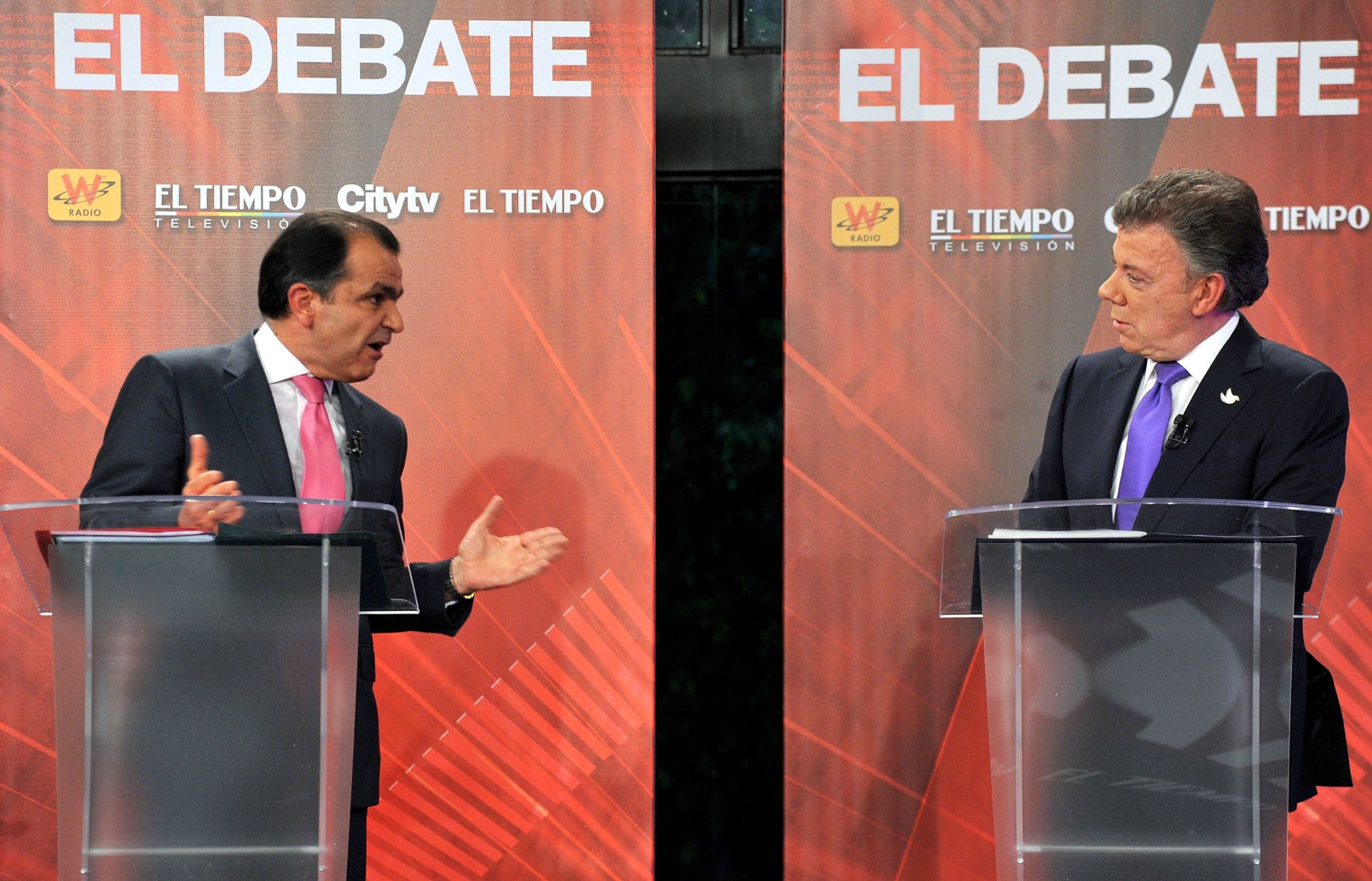
In a gripping TV spot, Colombian President Juan Manuel Santos looks straight into the camera and bellows: “No more war! No more war! No more war!”
That sums up Santos’s message ahead of Colombia’s June 15 presidential runoff. If he wins another four-year term, Santos has claimed he will sign a peace treaty with Marxist rebels and bring an end to the hemisphere’s oldest guerrilla conflict. So what’s not to like?
Plenty, according to Colombian voters. Opposition candidate Óscar Iván Zuluaga, a conservative former Treasury minister, has been gaining support based on his harsh criticism of ongoing peace talks between the guerrillas and the Santos government. Referring to the negotiations when he launched his presidential bid last year, Zuluaga declared: “We have to end this and end it now.”
Zuluaga topped Santos in the May 25 first round of balloting, though he failed to win more than half the votes required to avoid a runoff. The final pre-election polls released June 6 provided little clarity over what will happen on Sunday: One survey showed Santos up by five points, another showed Zuluaga leading by eight.
Santos had been the early favorite based on Colombia’s strong economic performance and progress at the peace talks. But with his aristocratic pedigree—Santos’s great uncle also served as president—he can be a stiff campaigner. His biggest problem, however, is that he has staked his re-election on making peace with a guerrilla army many voters see as narco-terrorists.
The Revolutionary Armed Forces of Colombia, or FARC, funds its war through kidnapping, extortion, illegal gold mining and drug trafficking and has committed myriad war atrocities. Now that the army has the upper hand on the battlefield, there is little stomach among Colombians for offering the FARC concessions at the peace table, such as allowing demobilized rebels to serve in Congress or to avoid prison for war crimes.
“Everyone wants peace, but not a humiliating peace. Not a peace that benefits a terrorist group that did not win this war,” said Gen. Jaime Ruiz, who heads an association of retired military officers.
Santos is no peacenik. He previously served as defense minister for President Álvaro Uribe, who launched a military campaign that halved the number of FARC troops to about 8,000 fighters. That turned Uribe into Colombia’s most popular politician and his endorsement helped Santos win the 2010 election. But instead of copying Uribe’s script, Santos surprised the country by opening negotiations with the FARC in Havana, Cuba, in Nov. 2012, rather than pressing his advantage.
It was a logical move given the FARC’s weakened state. In fact, the two sides have made far more progress than in previous talks held in the 1980s and 90s. But because the war is mainly fought in remote rural areas, most voters are disengaged from the conflict and put peace talks low on their list of priorities, behind issues like unemployment and health care.
In speeches, Santos reminds them that ending the war would free up billions of dollars for just such development. And he’s not backing down ahead of the election; on Tuesday, his government announced the opening of exploratory peace talks with the National Liberation Army (ELN), the smaller of the country’s two remaining rebel groups. Yet his pivot from war to peace has some Colombians feeling betrayed – and chief among them is his former boss.
Uribe, who served two presidential terms, is banned by the Constitution from running for a third. So instead, he formed a right-wing opposition party that is backing Zuluaga. In March, Uribe won a seat to the Senate and last month his support helped seal Zuluaga’s first-round victory. Indeed, some see the race as a contest between Santos and Uribe.
“Santos is from family of presidents and has his own political stature,” said Maria Victoria Llorente, who heads the Bogota think tank Ideas for Peace. “But Zuluaga doesn’t. He really could turn out to be a puppet for Uribe.”
Zuluaga insists that he’s no figurehead. He now says that if elected he will continue negotiating if the FARC agrees to a series of conditions — such as halting the recruitment of child warriors, the laying of landmines and attacks on civilians.
These demands sound reasonable. But Adam Isacson, a Colombia expert at the Washington Office on Latin America, says such conditions could be a deal-breaker. For one thing, they would be extremely difficult to verify. What’s more, the two sides are not negotiating surrender terms. Though the FARC has been battered, it has options. The steady flow of income from its criminal activities could keep the guerrillas fighting for years.
“They are still out there. They can still cause damage and that’s the problem,” Col. Eduardo González, commander of the army’s 2nd Mobile Brigade, told TIME as he sat in a military bunker in a red zone in southern Colombia. “Wars are not brought to an end by soldiers. They are ended by politicians.”
Colombians must now decide which candidate is up to the task.
More Must-Reads from TIME
- Inside Elon Musk’s War on Washington
- Meet the 2025 Women of the Year
- The Harsh Truth About Disability Inclusion
- Why Do More Young Adults Have Cancer?
- Colman Domingo Leads With Radical Love
- How to Get Better at Doing Things Alone
- Cecily Strong on Goober the Clown
- Column: The Rise of America’s Broligarchy
Contact us at letters@time.com